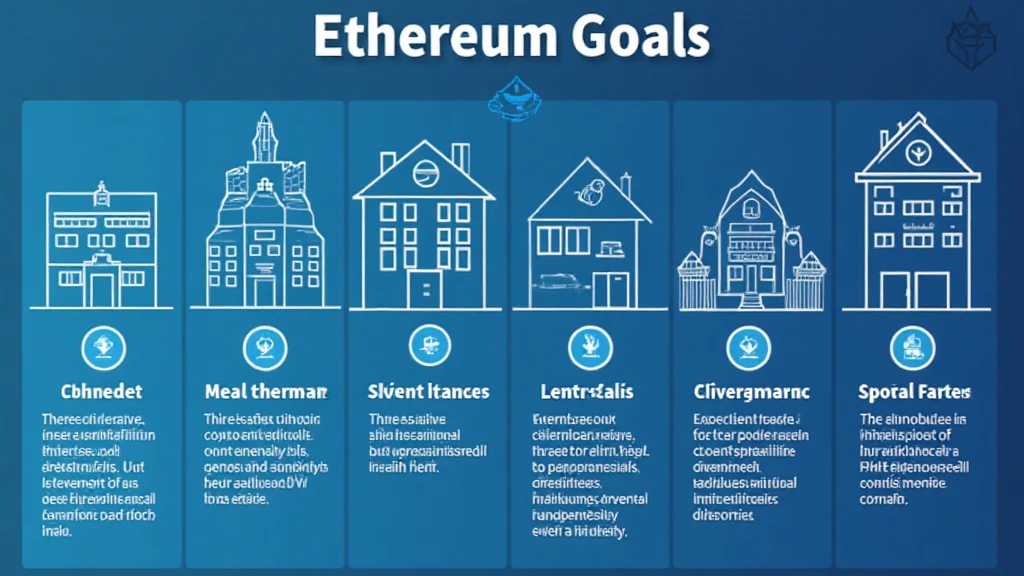Ethereum Real Estate Governance Models: A New Era of Property Management
Ethereum Real Estate Governance Models: A New Era of Property Management
With the real estate market valued at over $280 trillion globally, stakeholders are seeking innovative governance models to enhance efficiency and transparency. Ethereum, the leading smart contract platform, emerges as a potential game-changer, transforming traditional property management.
This article delves into Ethereum‘s application in real estate governance, analyzing its strengths, weaknesses, and future implications. Whether you’re a real estate professional or a cryptocurrency enthusiast, understanding these models offers valuable insights into a rapidly evolving landscape.
Understanding Ethereum‘s Role in Real Estate
Ethereum’s decentralized platform allows for the creation of smart contracts, self-executing contracts with the terms of the agreement directly written into code. This capability is vital for real estate transactions, enabling programmable real estate governance models.

Real estate professionals can leverage Ethereum in various ways:
- Property Title Management: Smart contracts can store property titles securely on the blockchain, eliminating the risk of forgery.
- Decentralized Finance (DeFi): Access to DeFi solutions can facilitate property financing, making capital more accessible.
- Investment Fractionalization: Tokenization of real estate assets allows for fractional ownership, broadening investment opportunities.
The Benefits of Ethereum-Based Governance Models
Implementing Ethereum in real estate governance presents several advantages:
- Transparency: Every transaction is recorded on a public ledger, reducing disputes and increasing trust among parties.
- Cost Efficiency: By eliminating intermediaries, Ethereum reduces fees associated with property transactions.
- Accessibility: Increased access to capital through tokenized assets can democratize real estate investments.
Case Studies of Successful Implementations
Let’s consider real-world applications of Ethereum in real estate:
- Propy: A platform that utilizes Ethereum to facilitate international real estate transactions through smart contracts, allowing buyers to purchase properties remotely.
- Real Estate Investment Tokens (REITs): Companies like Harbor are pioneering the use of blockchain technologies to tokenize real estate, increasing liquidity for investors.
Challenges and Limitations of Ethereum in Real Estate Governance
While promising, Ethereum governance models aren’t without challenges. Here are a few:
- Scalability: High gas fees and transaction times can hinder extensive adoption.
- Legal Compliance: Adhering to local regulations regarding real estate transactions remains a concern.
- Market Volatility: The fluctuating nature of cryptocurrency may deter some investors from entering the real estate space.
Future Trends in Ethereum Real Estate Governance
As blockchain technology continues to evolve, several trends are emerging:
- Integration with IoT: Smart homes can leverage Ethereum for automated transactions and data sharing.
- Focus on Sustainability: Developers may use blockchain to promote green building practices and verify sustainable development.
- Expansion in Emerging Markets: A growing number of users in countries like Vietnam illustrate the potential for Ethereum-based real estate solutions in developing economies.
The Vietnamese Market and Ethereum Adoption
According to recent data, the number of cryptocurrency users in Vietnam has surged by over 25% in the last year, indicating a favorable environment for blockchain applications. The Vietnamese government is also showing interest in exploring blockchain for governance and transparency.
tiêu chuẩn an ninh blockchain are becoming crucial as blockchain technology gains traction in Vietnam, paving the way for Ethereum to reshape local real estate governance models.
How Local Regulations Impact Ethereum Integration
The dynamic nature of cryptocurrency regulations in Vietnam necessitates continuous monitoring. Keeping abreast of these changes can help stakeholders decide on real estate investments using Ethereum.
Notably, regulations can either hinder or promote the growth of Ethereum applications in the real estate sector. Partnerships between traditional real estate entities and blockchain firms may provide necessary insights for navigating legal frameworks.
Conclusion: The Future of Ethereum in Real Estate Governance
As we assess Ethereum‘s impact on real estate governance models, it’s evident that innovation is at the forefront. While there are challenges, the advantages of transparency, efficiency, and accessibility positions Ethereum as a valuable tool for the industry.
Incorporating blockchain solutions can democratize real estate investments, particularly in emerging markets like Vietnam, where a surge in crypto adoption is promising. Stakeholders should stay informed and adapt to this evolving landscape.
For further insights into how technology and real estate intersect, visit coinsvaluechecker.
Authored by Dr. Linh Tran, a blockchain researcher with over 15 publications in the field and leading a project on smart contract auditing.


